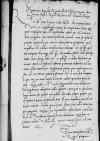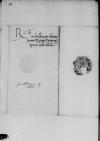List #2979
Sigismund II Augustus Jagiellon do Ioannes DANTISCUSVilnius, 1546-06-22
| odebrano Heilsberg (Lidzbark), 1546-06-29 Rękopiśmienne podstawy źródłowe:
| ||||
Tekst + aparat krytyczny + komentarz Zwykły tekst Tekst + komentarz Tekst + aparat krytyczny
Reverendo in Christo Patri, domino
Reverende in Christo Pater, sincere nobis dilecte.
Accepimus litteras Paternitatis Vestrae ex
Non est quod ad praesens repetendum sit, nam in eadem sententia perstamus, quod reipublicae et subditis omnibus bene volumus, nec quicquam apud nos antiquius chariusque est, quam ab omnibus probis domi forisque amari. Cura denique nobis est, ne quicquam in nobis desiderari patiamur, quod ad officium nostrum pertinere videretur. Sed non omnia nobis licent. Perspicimus futura pro captu ingenii nostri et occurrimus, quoad possumus. Sed ut nunc sunt tempora, si quae non ex animi nostri sententia cadunt, patienter ferenda sunt.
Quae nobis Paternitate Vestra suggeruntur, non molestiam, sed singularem voluptatem nobis afferunt. Nam pro ea prudentia longo rerum usu quaesita, qua pollet, illa nobis semper profert, quae ab optimo senatore proferenda sunt et quae reipublicae maxime conducere videntur. Scribat igitur secure, futura sunt nobis omnia semper pergrata. Reliqua ex superioribus nostris litteris iam in hunc diem Paternitatem Vestram cognovisse non dubitamus.
Quae bene ac faeliciter valeat.
Ex commissione sacrae maiestatis regiae propria

